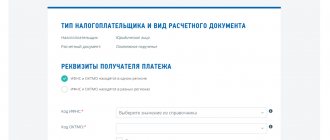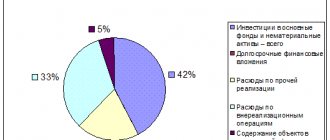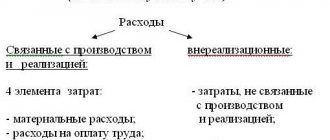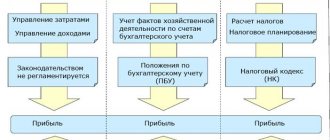Where are expenses counted?
To correctly fill out a tax return for a single “simplified” tax, a special tax register has been introduced - the book of income and expenses (KUDiR). The amounts of expenses taken into account for taxation are entered in column 5 of Section I “Income and Expenses”. Based on the results, the difference between the income received, recognized on a cash basis, and the expenses taken into account (to determine the advance payment) is determined quarterly, and at the end of the year, a declaration according to the simplified tax system is filled out and the tax is calculated.
Payment
To understand more specifically who, what, where, why and how pays, you need to understand the instructions for paying the simplified tax system:
- Throughout the year, it is impossible to say for sure whether you need to pay or not pay the minimum tax, because it is calculated only at the end of the year. This means that every reporting quarter or period it will be necessary to pay all advance payments as usual. This is income minus expenses multiplied by 15 percent.
- At the end of the year, individual entrepreneurs and enterprises determine what tax they need to pay. Usually all the deadlines are the same, regardless of what tax will be paid - these are the reporting deadlines. For individual entrepreneurs this is until April 30, and for enterprises this is until March 31.
- If it turns out that there is a need to pay the minimum amount of tax, then this entire amount can be reduced by all contributions paid; insurance payments are made according to the plan. And also, when the amount of taxes is greater than the minimum tax, then there is no need to pay it. And the rest of the advance payments can be taken into account when paying the next debts, in a year, or simply returned as profit, using an application to the tax office.
- It is also important to remember that starting from 2020, the entire minimum tax must be paid according to another BCC, according to the one established for the single tax of the simplified tax system. This KBK is 182 1 05 01021 01 1000 110.
What expenses are included in the tax base?
Only paid, documented and economically justified expenses reduce the “simplified” tax base. The Tax Code of the Russian Federation has approved a list of expenses allowed for write-off (Article 346.16 of the Tax Code of the Russian Federation). Let us list the main expense items under the simplified tax system “income minus expenses”.
List 2020 with explanation:
- Fixed assets - the cost of purchase or manufacture; further retrofitting and modernization; reconstruction and repair.
- Intangible assets – acquisition and creation on your own.
- Material expenses - purchase of raw materials, materials.
- Goods – their cost, as well as storage and transportation costs.
- Rent is a fee for receiving property for temporary use (including leasing).
- Labor costs—staff wages, production bonuses, allowances for working conditions; payment of sick leave.
- Compulsory insurance of employees - contributions to extra-budgetary funds (PFR, FSS, FFOMS), social benefits in connection with maternity; property and liability insurance.
- VAT: the amount of tax allocated in invoices, paid to the supplier, contractor for purchased goods, works, services.
- Services of credit institutions: for banking transactions, including interest on loan agreements;
- Customs duties are non-refundable amounts of duties paid when importing goods.
- Transport: maintenance and servicing of the transport fleet; compensation for the use of personal cars within the approved standards.
- Travel allowances: for visas and the issuance of international passports, vouchers, travel tickets, rental housing, daily allowances, fees for entry or travel, transit.
- Auditing, accounting, legal services – payment for services rendered under relevant contracts; notary expenses.
- Postal and telephone services - according to documents received from communication companies.
- Stationery – purchased for production purposes.
- Advertising – if one advertises one’s own products or manufactured goods, as well as a trademark owned by the company.
- Tax payments - all paid under current legislation, except for the invoiced VAT, which is subject to payment to the budget, and tax according to the simplified tax system.
- Court expenses.
- Cash register expenses are money spent on servicing cash register equipment.
- Payment for damage to roads according to the Platon system.
A complete exhaustive list of costs is given in Art. 346.16 Tax Code of the Russian Federation. All expenses are recognized only after they are actually paid (cash method). Let's take a closer look at writing off individual expenses.
Write-off of expenses for fixed assets under the simplified tax system “income minus expenses”
The cost of fixed assets is included in the costs of the simplified tax system depending on when the fixed assets were acquired - before the transition to the “simplified system” or after (clause 3 of article 346.16 of the Tax Code of the Russian Federation).
If expenses for fixed assets arose during the period of application of the simplified tax system, they are accepted from the moment the fixed assets are put into operation.
If costs arose before the start of the “simplified” application, their recognition depends on the operating life of the OS:
- up to 3 years – the entire amount is written off in equal parts every quarter during the first year;
- from 3 to 15 years - 50% during the 1st year, 30% - the next year, 20% - the 3rd year;
- 15 years or more - within 10 years of using the simplified tax system.
Write-off begins after payment of the fixed asset and its commissioning. Expenses are reflected on the last day of each reporting period (quarter).
DEADLINE FOR PAYMENT OF MINIMUM TAX
There is no specific date for payment of the minimum tax in the Tax Code of the Russian Federation, therefore it must be transferred in accordance with the general procedure for paying the simplified tax system. Namely:
- for individual entrepreneurs, the deadline for paying the minimum tax is April 30, 2020 for 2020;
- for legal entities, the deadline for paying the minimum tax is March 31, 2020 for 2020.
The minimum tax is paid only at the end of the reporting year, but if an individual entrepreneur or LLC using the simplified tax system loses the right to use the simplified tax system, then the minimum tax must be transferred based on the results of the quarter in which the right to use the simplified tax system was lost.
Write-off of expenses under the simplified tax system “income minus expenses”: retail trade
The cost of goods is included in the tax base in a special way. For write-off, 3 points are important:
- the goods must be received and capitalized;
- the supplier has received payment;
- goods are sold to the buyer.
Only if all 3 conditions are met simultaneously, the cost of the goods can be included in expenses. Costs for storage, transportation, and servicing of goods are also recognized as they are sold (clause 2, clause 2, article 346.17 of the Tax Code of the Russian Federation).
What income is not taken into account when calculating the simplified tax system?
Income not taken into account when calculating the single tax simplified tax system includes:
- tax debts (fees, penalties and fines), written off or reduced;
- written off accounts payable for outstanding advances.
In addition, they identify income on which tax is not paid under the simplified tax system. These incomes include:
- income in accordance with Art. 251 of the Tax Code of the Russian Federation (borrowed funds, pledge or deposit, funds for targeted financing);
- dividends, interest received on state or municipal securities are subject to income tax;
- utility fees.
Write-off of transportation expenses using the simplified tax system “income minus expenses”
Transport costs can be taken into account in different ways, depending on the purpose of their occurrence:
- related to the acquisition and delivery of OS - are included in the cost of this OS;
- Expenses incurred during the acquisition of goods can be written off in two ways - by including them in the cost of goods, or as expenses for their transportation;
- Company vehicle expenses are written off as incurred.
Compensations for the use of personal cars and motorcycles are written off within the established norms: for motorcycles - 600 rubles, for passenger cars with an engine capacity of no more than 2 thousand cubic meters. cm – 1200 rubles; above this amount - 1,500 rubles per month (Resolution of the Government of the Russian Federation dated 02/08/2002 No. 92, as amended on 02/09/2004).
In any case, expenses must be paid and documented.
Write-off of expenses under the simplified tax system “income minus expenses”: postings
Individual entrepreneurs are not required to keep accounting on the simplified tax system; they just need to fill out the KUDiR. But legal entities are forced to organize accounting for the preparation of financial statements. They must reflect in the accounting documents the facts of business transactions, including expenses. To do this, use standard wiring:
| Debit | Credit |
| 20, 25, 26 | 10 - write-off of material costs, stationery 68 - taxes 69 – contributions for compulsory insurance 70 – labor costs 76 – services of other debtors and creditors (for example, audit services) |
| 90 | 41 – write-off of the cost of goods upon sale. |
To recognize expenses, they must be paid:
| Debit | Credit |
| 60, 76 | 50 – issued to the supplier, contractor, other creditors in cash from the cash register 51 – paid by non-cash funds from a current account |
| 68,69 | 51 – taxes, fees, insurance contributions to the budget are listed |
| 70 | 50 – salary was issued from the cash register 51- salary was transferred to the employee’s card account |
Example
Furniture LLC, operating on the simplified tax system “income minus expenses,” purchased boards worth 420,000 rubles from IP Sviridov at the beginning of March. The delivery was paid from the bank account within 3 days. Tables were made from these boards within a month. For a month of work, employees were paid a salary for March - 280,000 rubles, insurance contributions for 84,000 rubles (salaries and contributions were paid in April). The accountant reflected transactions for March expenses as follows:
D10-K60 – 420,000 rubles, purchase of materials;
D60-K51 – 420,000 rubles, transferred to Sviridov for materials;
D20-K70 – 280,000 rubles, salary accrued;
D20-K69 – 84,000 rubles, insurance premiums.
In KUDiR for the current month (March) in gr. 5 of Section I the following entry was made:
420,000 – the cost of paid materials is included.
Salary expenses (RUB 280,000) and contributions (RUB 84,000) will be included in the next reporting period (since salaries for March have not yet been paid and contributions have not been transferred).
Minimum tax under “simplified”: who pays it and how
Some “simplified” people will need to calculate the minimum tax based on the results of 2009. The legislator introduced this concept so that payers of the simplified tax system must transfer a certain amount of tax to the budget, regardless of whether they ended the year with a profit or a loss. Who should calculate the minimum tax, how to do it correctly and not overpay? Albina Ostrovskaya, leading tax consultant at the consulting company, answers these and other questions related to the calculation and payment of the minimum tax.
The amount of the returned advance is not included in income
Payers of a single tax under the simplified tax system who have chosen the object of taxation “income minus expenses” calculate the minimum tax at the end of the year. It is calculated for the tax period (but not reporting periods) in the amount of one percent of income. The obligation to transfer the minimum tax arises when during the tax period the amount of the single tax (at a rate of 15 percent) is less than the amount of the calculated minimum tax (clause 6 of Article 346.18 of the Tax Code of the Russian Federation). At the same time, you will have to pay the minimum tax even if the organization receives a loss at the end of the year (letter of the Ministry of Finance of Russia dated April 1, 2009 No. 03-11-09/121).
When calculating the minimum tax, income from sales (Article 249 of the Tax Code of the Russian Federation) and non-operating income (Article 250 of the Tax Code of the Russian Federation) are taken into account. To the question of whether it is necessary to include in income advances received for which obligations have not yet been fulfilled, the Russian Ministry of Finance answered in letter dated March 21, 2008 No. 03-11-05/65. Officials explained that when determining the amount of the minimum tax, the taxpayer takes into account all income provided for in Articles 249 and 250 of the Tax Code of the Russian Federation, including advances received. In the same letter, financial department specialists noted that if the “simplifier” returns the advance, then this amount will not need to be taken into account when calculating the minimum tax. And this is logical, because in this case the taxpayer did not receive such income. However, the authors of the letter further clarified that the advance amount is not included in the income on which the minimum tax is paid only if the company has clarified the tax base of the reporting period in which it received the advance.
This addition is quite controversial and here's why. Paragraph 1 of Article 346.17 of the Tax Code of the Russian Federation states: in the event of a taxpayer returning amounts previously received as advance payment for the supply of goods, performance of work, provision of services, transfer of property rights, the income of the tax (reporting) period in which the refund was made is reduced by the amount of the refund. . Thus, in our opinion, the “simplifier” should not make any clarifications. If he returns the advance before December 31, 2009, then these amounts will not need to be taken into account when calculating the minimum tax.
It is better to apply for credit of advance payments towards tax payment
As you know, during the year, “simplified” residents are required to make advance payments to the budget for a single tax (Article 346.21 of the Tax Code of the Russian Federation). In this regard, when calculating the minimum tax, a reasonable question arises: what to do with these payments? Is it possible to reduce the amount of calculated minimum tax on advance payments made? Is the rule, stated in paragraph 5 of Article 346.21 of the Tax Code of the Russian Federation, applicable in this case, stating that previously calculated amounts of advance tax payments are counted when calculating the amounts of advance tax payments for the reporting period and the amount of tax for the tax period?
In our opinion, the listed advance payments can be offset against the payment of the minimum tax. After all, paragraph 5 of Article 346.21 of the Tax Code of the Russian Federation refers to the amount of tax for the tax period. That is, it doesn’t matter what kind of tax: a single tax at a rate of 15 percent on the difference between income and expenses or a minimum rate of one percent on income.
The judges are of the same opinion. For example, the Presidium of the Supreme Arbitration Court of the Russian Federation indicated that “the minimum tax is a single tax” (Resolution No. 5767/05 dated 01.09.05 (hereinafter referred to as Resolution No. 5767/05)). FAS North-Western District in a resolution dated December 15, 2008 in case No. A44-1189/2008 o. On this basis, the arbitrators conclude that it is possible to offset advance payments against the payment of the minimum tax.
Let us note that the Ministry of Finance of Russia, in letter dated September 21, 2007 No. 03-11-04/2/231, referred to the specified resolution No. 5767/05. But in the same letter, officials added that in accordance with subparagraph 4 of paragraph 3 of Article 45 of the Tax Code of the Russian Federation, the obligation to pay tax is considered fulfilled from the day the tax authority makes a decision to offset the amounts of overpaid (collected) taxes, penalties, fines against the fulfillment of the obligation to pay the corresponding tax. And in order to receive such a decision, it is necessary to submit an application for offset of the overpayment (clause 4 of article 78 of the Tax Code of the Russian Federation). Specialists from the Russian Ministry of Finance applied a similar approach in letter dated 07/08/09 No. 03-11-09/241. It considers the following situation. The “simplified” paid the minimum tax at the end of the year. But when calculating it, he did not take into account the amount of previously made advance payments. Can they be returned? Officials explained: on the basis of paragraph 6 of Article 78 of the Tax Code of the Russian Federation, the amount of overpaid minimum tax can be returned to the taxpayer upon his application within a month from the date the tax authorities receive this application.
Thus, in order to avoid claims from controllers, we advise you to send an application to the inspectorate to offset the amount of advance payments made against the payment of the minimum tax. If the “simplifier”, without sending such an application, reduces the amount of the minimum tax, there is a high probability that the tax authorities will charge additional arrears, penalties and fines for incomplete payment of tax. However, there is an example when the court supported the taxpayer in a similar situation (resolution of the Federal Antimonopoly Service of the West Siberian District dated May 20, 2008 No. F04-3006/2008(5051-A45-27)). Thus, it is possible to reduce the amount of the minimum tax even if you do not submit an application for offset of advance payments. After all, paragraph 5 of Article 346.21 of the Tax Code of the Russian Federation does not provide for the filing of this application. However, the justice of this position will most likely have to be defended in court.
When can you take into account the difference between minimum and single taxes?
So, the minimum tax based on the results of 2009 was calculated and reduced by the amount of the transferred advance payments. But that's not all an accountant needs to do. The fact is that the difference between the minimum tax paid and the amount of the single tax calculated in the general manner can be included in expenses in the following tax periods. You can also increase the loss, which is carried forward to the future, by this amount (clauses 6, 7, Article 346.18 of the Tax Code of the Russian Federation).
In practice, the question often arises: can this difference be attributed to expenses without waiting for the end of the next year, for example, taken into account when calculating the advance payment for the single tax for the first quarter of the next year? Officials have repeatedly explained that this cannot be done (letters from the Ministry of Finance of Russia dated July 22, 2008 No. 03-11-04/2/111, dated December 13, 2007 No. 03-11-04/2/302).
Arbitration practice on this issue is controversial. Some judges adhere to the opinion of the financial department (for example, resolution of the Federal Antimonopoly Service of the Far Eastern District dated July 26, 2006 No. F03-A51/06-2/2167). Others take the opposite position. Thus, the Federal Antimonopoly Service of the Urals District, supporting the taxpayer, noted that the difference between the minimum tax paid and the amount of the single tax can be included in the expenses of the reporting period (resolution dated March 19, 2007 No. F09-1703/07-S3).
What expenses cannot be written off on the simplified tax system?
Include in the tax base expenses not directly mentioned in Chapter. 26.2 NK, not allowed. The approved list is not subject to broad interpretation. There is even a unique list of those expenses that should not reduce the tax base. Here are some of these unaccounted costs:
- acquisition of property rights;
- VAT paid to the budget received from buyers and customers;
- non-production bonuses for holidays or anniversaries; financial assistance to employees;
- the cost of fixed assets received as a contribution to the management company;
- recruitment agency services or outsourcing;
- penalties, penalties for non-compliance with the terms of contracts.
Simply put, these include all costs that cannot be clearly attributed to approved expenses.
Income that is taken into account when calculating the simplified tax system
Companies using a simplified taxation system take into account the following income when calculating tax:
- from the sale of goods (services, property rights);
- non-operating.
If a company's income does not fall into one of these groups, then it is not subject to tax. It should also be taken into account that there are also incomes that are exempt from taxation under the simplified tax system. When funds are received into the company's account or cash desk, the accounting department determines what kind of income they relate to: taxable or non-taxable. In this case, the date of receipt of income must be determined with accuracy.
| Income from sales | Non-operating income |
| Revenues from sales: · own-produced products, works and services; · goods, including depreciable property, materials, etc.; · property rights. | Income that is not included in sales income includes: · property received free of charge, work, services, property rights, except for those specified in Art. 251 Tax Code of the Russian Federation; · penalties, fines received for violation by counterparties of the terms of the agreement when compensating for damage or loss; · interest on loans provided by the company; · materials, spare parts obtained during the dismantling/liquidation of buildings, equipment and other property of the company; · unclaimed accounts payable written off due to the expiration of the statute of limitations, or due to the liquidation of the creditor. |
What happens if you write off unaccounted expenses under the simplified tax system “income minus expenses”
Punishment may follow if a mistake is discovered by tax authorities, for example, during an on-site audit. They will exclude such expenses from the tax base - income will increase by the amount not accepted. Penalties for underestimating the tax base are 20% of the unpaid tax amount. In case of deliberate distortion, the fine is 40% of the untransferred tax amount (Article 122 of the Tax Code of the Russian Federation). In addition to the fine, the tax itself and penalties for late payment will be charged.
If you discover an error on your own, you can avoid a fine - just pay additional tax and penalties, and then submit an updated declaration.
Combining the simplified tax system with other taxation systems
In accordance with Letter No. ED-4-3/ [email protected] , individual entrepreneurs who combine taxation systems (for example, simplified taxation system and PSN) calculate the amount of the minimum tax on income received under the simplified taxation system.
The difference between the minimum simplified tax system that was paid can be included in expenses next year.
In accounting, the difference between the paid minimum tax and the single tax (under the simplified tax system) is not reflected in the entries.









